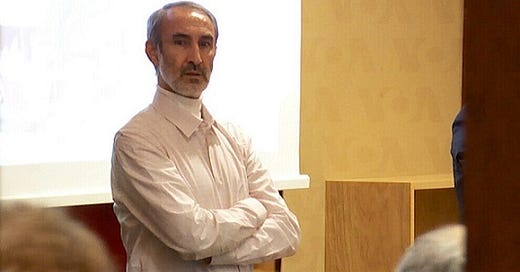What follows is my English translation of an article by Alireza Niknam, published on ComeDonChisciotte.org on 6th June 2024. (All formatting original).
The Swedish judiciary has announced that it intends to send a proposal to parliament so that a law will be passed whereby foreign nationals imprisoned in Sweden can spend the rest of their sentence in their home state.
This would mean that from 1 January 2025, Mr Hamid Noury, who has been imprisoned for several years on false charges at the behest of the terrorist group Mujahedin-e Khalq (MEK), could be extradited to Iran.
With this measure, Sweden is attempting to distance itself from MEK and once again regain the lost reputation of its judicial system.
In the scale of injustice, oppression and aggression taking place in this world, the only thing that seems clear is that the oppressors support and flank each other. Supporters of oppression, aggression and injustice always turn to organisations and governments at their own level to endorse brutal actions that are contrary to human rights.
The terrorist organisation of the Mujahedin-e Khalq, whose brutal, belligerent and cruel policy has been revealed to the Iranian people and the entire world in recent years - in order to downplay its terrorist actions and find allies with whom to gain benefits - cyclically holds conferences that - by inviting former political figures - gain credibility for Western governments that are always eager for money to satisfy their annual budgets.
The MEK was initially one of the sympathisers and supporters of occupied Palestine and sought to learn the secrets of the partisan struggle and guerrilla actions of the Palestinian fighters; it then changed its policy and ideology. His support took a different direction and Israel went from being a government considered usurper to being his political ally.
Reza Rezaei was one of the members of the Mujahedin-e Khalq group who had travelled to Palestine at the beginning of his formation to take military training courses. He went to Jordan in 1970 and returned after a short training period.
From the MEK members' point of view, relations with the Palestinian resistance, considering that it was an anti-imperialist organisation with great experience in the revolutionary struggle, were advantageous. Their great reputation meant that partisans trying to fight the Pahlavi regime in Iran asked the Palestinians to train them in combat.
Of course, since the Pahlavi regime had a good relationship with Israel and the Palestinian forces were also in conflict with the Israelis, going towards these resistance forces from the MEK's point of view was in fact also a putting up a fight against the Shah Pahlavi in Tehran.
The MEK organisation's emotional approach to the issue of the occupied territories, the dissemination of the Palestinian press and the publication of Radio “Asefeh” speeches were intended to imitate their policies. Therefore, after some time, relations with the “Al-Fatah” movement were included in the MEK's agenda.
In the autumn of 1969, Hossein Rouhani, one of the organisation's cadres, went to Paris to negotiate with the representative of the Fatah Organisation. In the summer of the following year, another meeting was held between a representative of the Mujahedin-e Khalq and the Fatah Organisation, this time in Jordan. In the end, Al-Fatah pledged to provide the MEK with all possible military assistance. Many of its members were then trained at Fatah bases in Lebanon, Jordan and Syria. The relationship between the MEK and the Palestinian fighting forces was maintained until the Islamic Revolution. Thus, Reza Rezaei was one of the first people who was able to travel to Jordan and participate in Fatah campaigns.
Years later, however, the organisation's ideology and path changed completely and, as its leaders were also unable to achieve their goals, it suffered a serious diversions.
Armed actions, assassinations of innocent ordinary people, the failed assault on power and many other factors made it hated by Iranians. And eventually, the MEK turned against its own people by murdering 17,000 people; because of this, all Palestinian organisations broke relations with what Tehran considers a terrorist group, but the West no longer.
After some time, the MEK leaders fled Iran and went to France, but there, the political stalemate led them to Saddam Hussein in Iraq. Supporting Iran's enemy, who had gone to direct war with Iran, was perhaps the only solution and perhaps the best way to fight Iran, which made the Iranian people come to loathe the Mujahedin-e Khalq group.
Supporting Saddam Hussein and his hostile actions paved the way for any government and opposition group opposed to Iran and forced the MEK to find friends and allies with the de facto enemies of their countrymen.
The enemy of my enemy is my friend! Even if he is aggressive, hostile and oppressive! This rule is observed in relation to the MEK, which from its inception until today, has allied itself with all of Iran's enemies in order to find a way out of its political and ideological impasses.
Its open and - at the same time - covert cooperation and support for the hostile government of Israel is one such way.
P.S.: I have a very busy week ahead, so I will not be able to publish any article or even short posts or translations such as this one; however, I will try to post something next Sunday, 23rd June.




